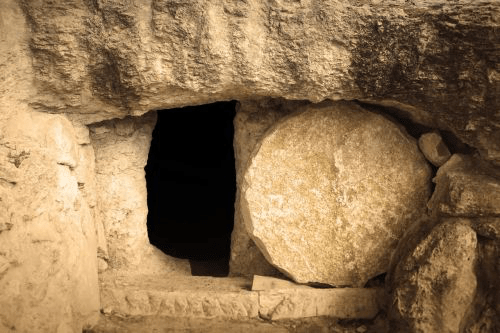An Easter homily inspired by the sermon preached by Bishop Lancelot Andrewes before King James at Whitehall on Easter Sunday 1609.
The New Testament word for sepulchre, tomb (as in empty tomb) is mnema. It’s the word that gives us memorial, memory, and mnemonics. The stories in the gospels about Jesus expelling demons from men living in tombs are for me about freeing them from living in their memories, from living in the past.
People who live in the past cling to resentments, unable to let go, unable to forgive, unable to move on. They are entombed in the past. Think of Miss Havisham in Great Expectations. Think of parents who live through the achievements of their offspring. Think of sad men propping up sports club bars boring all and sundry with tales of their sporting achievements decades ago before their bellies started hanging over their belts.
Now think of the Easter story. The stone is rolled away. The contents of the tomb have escaped.
Can you see that this is an invitation for us to let go of the past? If we are to live life abundant then we have to let go and move on. The empty tomb means the past is cleansed. It is forgiven.
Think of people who refused to support Jesus, who deserted him, who told lies about him to save their skins or to curry favour with authority, who joined the chanting mob. How many of the Palm Sunday supporters joined that baying crowd? Now think how shocked they must have been to hear that the man they’d condemned wasn’t dead and gone, but might meet them in the street. It’s like gossiping with a friend about a mutual acquaintance who, just as you’ve made the most utterly bitchy remark, appears round the corner and cheerfully greets you. You want the ground to open up and swallow you.
How does Jesus react when he meets his so-called friends again? Does he berate them? Does he take them to court? Does he arrange for some big fellers from the local pub to kneecap them?
No, none of this. All he says is “Peace”. It’s like he says, “never mind the past, friends, let’s get on—we’ve got work to do”. They—we—are forgiven.
Now, think of those times you’ve gossiped, betrayed, told half-truths to get you out of a tight corner, or blindly followed the crowd. The story is not just about 2000 years ago. It’s about human nature, yours and mine, NOW. It’s about death of pride and ego and self in order that selflessness can ascend. We need to, we must, forgive and let go, otherwise we become entombed in living death. This is not about an afterlife—it’s about life abundant before death.
The most difficult person you’ll ever have to forgive is yourself. Some of us like wallowing in it, turning masochism into an art form. But life is to be lived. People make the mistake of thinking that forgiveness will just happen. It won’t. It’s hard work. We have to practise it like we have to practise any skill. We have to keep telling ourselves that we are forgiven. We have to brainwash ourselves. This is important as we get older because the brain circuits that deal with long-term memory are more robust than those that deal with short-term memory, so we old people more readily recall the past than last week.and it becomes harder to imagine the future.
Forgiveness doesn’t mean you escape the consequences of your actions, but it helps you to move on and make the best of—confront—the hole you’ve got yourself into. It helps you to escape the tomb and see the big wide world: eyes that see shall never grow old.
The penalty for living in the past is to become wizened, resentful, odious, and mendacious. We risk becoming deeply unattractive miserable gits. If we behave like that, people will avoid us, and rightly so. The only person I harm by living in the past is me.
As Andy and Red say in Shawshank, “get busy living or get busy dying”. The choice is yours.
Happy Easter.

Just read that Stanley reminded me of my own many shortcomings and the importance of forgiveness.
We’re all in the same boat. Don’t beat yourself up. I trust you thrive.
“Wizened, resentful, odious, and mendacious?”
An apt description of some I have known.
Excellent thank you.
Forgiveness of sel& and others is an ongoing process and struggle and as you say vital to having life.
Happy Easter
Happy Easter to you too